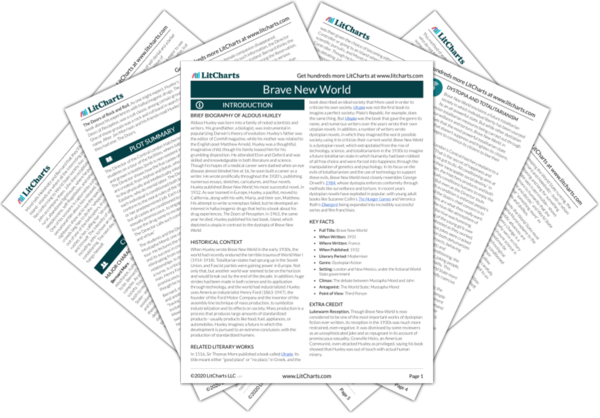
Welcome to the LitCharts study guide on Aldous Huxley's Brave New World. Created by the original team behind SparkNotes, LitCharts are the world's best literature guides.
Aldous Huxley was born into a family of noted scientists and writers. His grandfather, a biologist, was instrumental in popularizing Darwin's theory of evolution. Huxley’s father was the editor of Cornhill magazine, while his mother was related to the English poet Matthew Arnold. Huxley was a thoughtful, imaginative child, though his family teased him for his grumbling disposition. He attended Eton and Oxford and was skilled and knowledgeable in both literature and science. Though his hopes of a medical career were dashed when an eye disease almost blinded him at 16, he soon built a career as a writer. He wrote prolifically throughout the 1920's, publishing numerous essays, sketches, caricatures, and four novels. Huxley published Brave New World , his most successful novel, in 1932. As war loomed in Europe, Huxley, a pacifist, moved to California, along with his wife, Maria, and their son, Matthew. His attempt to write screenplays failed, but he developed an interest in hallucinogenic drugs that led to a book about his drug experiences, The Doors of Perception . In 1963, the same year he died, Huxley published his last book, Island , which depicted a utopia in contrast to the dystopia of Brave New World .
Get the entire Brave New World LitChart as a printable PDF."My students can't get enough of your charts and their results have gone through the roof." -Graham S.

When Huxley wrote Brave New World in the early 1930s, the world had recently endured the terrible trauma of World War I (1914-1918). Totalitarian states had sprung up in the Soviet Union, and Fascist parties were gaining power in Europe. Not only that, but another world war seemed to be on the horizon and would break out by the end of the decade. In addition, huge strides had been made in both science and its application through technology, and the world had industrialized. Huxley uses American industrialist Henry Ford (1863-1947), the founder of the Ford Motor Company and the inventor of the assembly line technique of mass production, to symbolize industrialization and its effects on society. Mass production is a process that produces large amounts of standardized products—usually products like food, fuel, appliances, or automobiles. Huxley imagines a future in which this development is pursued to an extreme conclusion, with the production of standardized humans .
In 1516, Sir Thomas More published a book called Utopia . Its title meant either "good place" or "no place," in Greek, and the book described an ideal society that More used in order to criticize his own society. Utopia was not the first book to imagine a perfect society; Plato's Republic , for example, does the same thing. But Utopia was the book that gave the genre its name, and numerous writers over the years wrote their own utopian novels. In addition, a number of writers wrote dystopian novels, in which they imagined the worst possible society, using it to criticize their current world. Brave New World is a dystopian novel, which extrapolated from the rise of technology, science, and totalitarianism in the 1930s to imagine a future totalitarian state in which humanity had been robbed of all free choice and were forced into happiness through the manipulation of genetics and psychology. In its focus on the evils of totalitarianism and the use of technology to support these evils, Brave New World most closely resembles George Orwell's 1984 , whose dystopia enforces conformity through methods like surveillance and torture. In recent years dystopian novels have exploded in popular, with young adult books like Suzanne Collin’s The Hunger Games and Veronica Roth’s Divergent being expanded into incredibly successful series and film franchises.
Key Facts about Brave New WorldLukewarm Reception. Though Brave New World is now considered to be one of the most important works of dystopian fiction ever written, its reception in the 1930s was much more restrained, even negative. It was dismissed by some reviewers as an unsophisticated joke and as repugnant in its account of promiscuous sexuality. Granville Hicks, an American Communist, even attacked Huxley as privileged, saying his book showed that Huxley was out of touch with actual human misery.
The Doors of Rock and Roll. As one might expect, Huxley's book about his experiences with hallucinogenic drugs, The Doors of Perception , was a cult classic among certain groups. One of those groups was a rock and roll band in search of a name. After Jim Morrison and his friends read Huxley's book, they had one: The Doors.